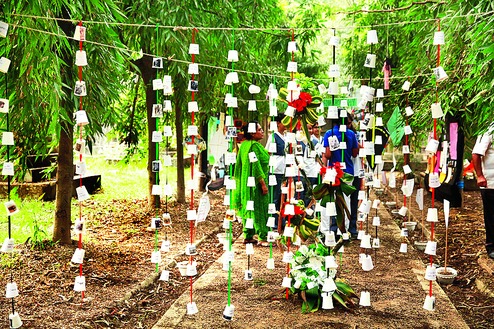

The hall-cum-lounge outside Gyan Manch, the central Calcutta auditorium, was milling mostly with mothers and children. A brother and a sister kicked each other with gusto as the parent sitting next to them pretended she was having an out-of-body experience.
Some other kids wearing intent expressions huddled before what looked like a delicate wire mesh adorned with confetti. A closer look revealed them to be handwritten notes from schoolchildren, reviews of The Flying Cow - the performance that was about to begin.
"It was so interesting... there were different animals. They all were figthing (sic)," read one pencilled note. Others: "They done the dance very well (sic)" and "The steps were hard especially the handstand. How's Netherlands like? (sic)"
The virtual fliers and teasers had described the initiative by ThinkArts as an "imaginative dance piece" by a Netherlands company, De Stilte. ThinkArts is a Calcutta-based organisation that "facilitates transformative arts events for children and young adults".
"Imaginative dance", "transformative arts" - the coinages barely registered. What followed was befuddling.
Three nimble-footed dancers took over the stage that was aflush with some clever lighting and stark props. Little eggs hanging from invisible strings went bippity bop all over it. And the cow? Well, there was a distinctive moo in the background and a pail that swung in the air (invisible strings again) from time to time. Other than that, zilch, nada...
But the children were on the edge of their seats. The parents kept looking from stage to ward, their expressions and reactions helping them read the performance. At the end, ThinkArts founder Ruchira Das invited the audience for an interaction with the dancer-actors.
The next thing you knew, the Lilliputian army was bounding stagewards. One two-feet-nothing gingerly touched an actor's hand. Later, Ruchira told me that that happens a lot, this non-verbal bonding, appreciation. "They [kids] seem to feel the need for a very literal touchpoint with the performance to internalise it."
Ruchira talks like that. Carefully thought out sentences, carefully picked out words, not platitudes, but so correct that there are moments when it feels like you are listening to an audio book. You get a sense that she is very methodical and is raring to tell her story from the beginning, but there are entire concepts one must wrap one's head around and consequent questions that get in the way of a linear narrative.
This transformative arts, is this an elitist thing? The crowd at Gyan Manch seemed to belong to a certain social set, but there was an announcement about tickets being priced a certain way so NGOs could bring in kids from a different world altogether.
Ruchira explains that while ThinkArts cannot and does not claim to have a non-urban audience, within the Indian urban space it would like to and is working to reach out to children across demographics. And these "other" children, can they relate to the performances? "They do. Because the whole thing is non-verbal, it is indeed very non-partisan."
ThinkArts, since its inception in 2013, has been operating out of schools, heritage spots, galleries, museums and public auditoriums. The presentations and workshops are mostly about children coming into a natural or constructed space and exploring it minus adult supervision. The endeavour seems to be all about performing experiences, even performing childhoods.
As opposed to? Well, tutored experiences, cookie-cutter information, heavily managed childhoods. Ridiculous that things have come to this. But at least someone noticed.
Dance, even pantomime, is one thing, but how do people react to these "ticketed experiences"? Ruchira talks about one of the very first things she floated in the city - a "sensorial journey". The venue was a gallery. Other creative stakeholders were Delhi-based puppeteer Anurupa Roy, local musician Rivu, and a Fulbright scholar from the US, Cynthia Siegel who was working with the Kumartuli artisans.
The way it worked, two kids at a time explored a row of cupboards, entered one, emerged into a maze and then into a space filled with ready Kumartuli-type puppets with a helping of clay and bare frames on the side. "There was a volunteer applying clay on a frame but she would not speak. If the kids saw her at play and wanted to follow suit, they could. But it was an invitation, not a command."
Next, Ruchira will be bringing to the city a theatre for babies. An artiste from the UK, Kevin Lewis, is supposed to be doing a couple of shows in Calcutta in September. She has seen his performances. "As an organiser, I study audience response as much as the creative piece. At the show I watched, the babies - between 8 and 18 months - were engaged for half an hour. They gurgled, waved and seemed to enjoy the experience."
Well, if we must, we must. Catch them really young.










